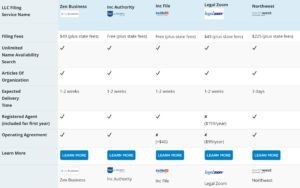What is a Rental Property LLC?
In the realm of real estate investing, a Rental Property LLC (Limited Liability Company) is a legal entity that offers numerous advantages for property owners. Operating as an LLC provides protection, liability limitation, and tax benefits, and enhances credibility and professionalism. This article will delve into the definition and explanation of a Rental Property LLC, as well as highlight its key advantages.
Definition and Explanation
A Rental Property LLC is a specific type of LLC that is formed to own and manage rental properties. An LLC is a legal structure that combines the limited liability protection of a corporation with the flexible management and tax advantages of a partnership. By creating a separate legal entity for your rental property business, you establish a clear distinction between your personal assets and your investment properties.
Forming a Rental Property LLC involves registering the entity with the appropriate state authorities and adhering to the specific regulations and requirements of that jurisdiction. This typically includes filing articles of organization, drafting an operating agreement, and obtaining the necessary licenses and permits.
Advantages of Operating as an LLC
Operating your rental property business as an LLC offers several notable advantages:
Take The Hassle Out Of Forming Your LLC. Compare The Best LLC Formation Services.
| Filing Fees | $49 + state fee | $49 + state fee | $49 + state fee | Free + state fee | $49 + state fee | $225 + state fee |
| Unlimited Name Availability Search | ✔ | ✔ | ✔ | ✔ | ✔ | ✔ |
| Articles Of Organization | ✔ | ✔ | ✔ | ✔ | ✔ | ✔ |
| Expected Delivery Time | 1-2 weeks | 24-hour processing, Free Express Shipping | 1-2 weeks | 1-2 weeks | Within 1 week | 3 days |
| Registered Agent (included for first year) | ✔ | ✔ | ✘ ($159/year) | ✔ | ✘ ($149/year) | ✔ |
| Operating Agreement | ✔ | ✘ | ✘ ($99/year) | ✔ | ✘ (+$35) | ✔ |
Asset Protection
One of the primary reasons investors choose to use an LLC for their rental properties is the asset protection it provides. As the owner of an LLC, your personal assets are generally shielded from any liabilities or lawsuits related to the rental properties. This means that if legal action is taken against your LLC, your personal savings, home, or other assets are generally protected.
Limited Liability
Similar to asset protection, an LLC offers limited liability protection. This means that as the owner, you are generally not personally responsible for the debts or obligations of the LLC. If the LLC faces financial difficulties or legal claims, your personal finances are typically safeguarded.
Tax Benefits
LLCs offer attractive tax benefits for rental property owners. By default, an LLC is treated as a pass-through entity for tax purposes. This means that the rental income and expenses “pass-through” the LLC and are reported on the owner’s individual tax return. This structure allows you to avoid double taxation that can occur with corporations, where both the corporation and the owner are taxed separately.
Furthermore, LLC owners may be eligible for certain deductions, such as depreciation, mortgage interest, repairs, and maintenance expenses, which can significantly reduce their taxable income and overall tax liability.
Credibility and Professionalism
Operating your rental property business as an LLC adds a layer of credibility and professionalism. Potential tenants and business partners often view an LLC as a more legitimate and trustworthy entity compared to individual landlords. The LLC structure demonstrates a level of commitment and seriousness toward managing the rental properties, which can attract higher-quality tenants and foster better business relationships.
Why Form an LLC for Your Rental Property Business?
Forming a Limited Liability Company (LLC) for your rental property business can offer numerous benefits. This article will explore the reasons why creating an LLC is a wise decision, focusing on the protection of personal assets, tax advantages, and the enhancement of credibility and professionalism. By understanding these advantages, you can make an informed choice for your rental property business.
Protecting Personal Assets
Separation of Personal and Business Finances
Creating an LLC establishes a clear separation between your personal and business finances. This separation is vital because it protects your personal assets, such as your savings account, home, and investments, from any liabilities that may arise from your rental property business. In the event of legal claims or financial difficulties faced by the LLC, your personal assets are generally shielded.
Shielding Personal Assets from Lawsuits and Claims
Another significant advantage of an LLC is that it shields your personal assets from lawsuits and claims related to your rental property business. If a tenant or third party takes legal action against your LLC, your personal finances and assets are typically protected. This protection can provide peace of mind and safeguard your hard-earned wealth.
Tax Advantages
Pass-through Taxation
When you form an LLC for your rental property business, you can take advantage of pass-through taxation. This means that the rental income and expenses “pass-through” the LLC and are reported on your individual tax return. Unlike a corporation, where double taxation can occur at both the corporate and individual levels, an LLC’s pass-through taxation structure helps you avoid this issue.
Deductible Expenses
Operating as an LLC allows you to benefit from various deductible expenses related to your rental property business. These expenses can include repairs, maintenance, property management fees, advertising costs, and even depreciation. By properly documenting and deducting these expenses, you can reduce your taxable income, resulting in lower tax liability.
Tax Flexibility and Planning
LLCs offer tax flexibility and planning opportunities. As the owner, you have the freedom to choose how you want your LLC to be taxed. By consulting with a tax professional, you can explore options such as electing to be treated as an S Corporation, which may provide additional tax advantages. This flexibility allows you to optimize your tax strategy and minimize your overall tax burden.
Enhancing Credibility and Professionalism
Perception of Seriousness and Commitment
Forming an LLC for your rental property business demonstrates a level of seriousness and commitment. Prospective tenants and business partners often view an LLC as a more professional and trustworthy entity compared to individual landlords. This perception can attract higher-quality tenants and foster stronger business relationships.
Building Trust with Tenants and Partners
Operating your rental property business as an LLC helps build trust with tenants and business partners. The LLC structure signals that you have taken steps to protect their interests and that you operate your business in a transparent and accountable manner. Building trust is crucial for maintaining positive tenant relationships and attracting reliable partners for future ventures.
Steps to Form a Rental Property LLC
Forming a Rental Property LLC (Limited Liability Company) for your real estate investment endeavors is a strategic move that offers various benefits. This article will guide you through the essential steps to successfully establish a Rental Property LLC. From research and planning to obtaining necessary licenses and permits, following these steps will ensure a smooth and compliant formation process.
Research and Planning
Choosing the Right Business Name
The first step in forming an LLC is selecting a suitable business name. Your chosen name should be unique, memorable, and relevant to your rental property business. It’s crucial to conduct a thorough search to ensure the name is not already in use by another business entity. Additionally, check the availability of domain names associated with your chosen business name for future online presence.
Selecting an Appropriate Business Structure
Decide on the appropriate business structure for your rental property LLC. The most common option is a single-member LLC, where you are the sole owner, or a multi-member LLC if you have partners or co-owners. Research the legal and tax implications of each structure and choose the one that aligns with your specific needs and goals.
Registering Your LLC
Filing Articles of Organization
To officially register your Rental Property LLC, you’ll need to file the Articles of Organization with the appropriate state authority. This document outlines vital information about your LLC, such as its name, address, purpose, and the names of its members or managers. Submit the completed form along with the required filing fee to the designated state agency responsible for business registrations.
Obtaining an EIN (Employer Identification Number)
An Employer Identification Number (EIN) is a unique identifier for your rental property LLC, similar to a social security number for individuals. Apply for an EIN through the Internal Revenue Service (IRS) by completing the online application or submitting Form SS-4. The EIN is necessary for tax purposes, opening a business bank account, and hiring employees, if applicable.
Drafting an Operating Agreement
An operating agreement is a crucial document that outlines the internal workings and governance of your rental property LLC. Although not required by all states, it is highly recommended to create an operating agreement to define the rights and responsibilities of LLC members, decision-making processes, profit distribution, and more. Seek legal assistance to draft an operating agreement tailored to your specific needs.
Opening a Business Bank Account
Separating your personal and business finances is essential for maintaining the liability protection offered by your Rental Property LLC. Open a business bank account dedicated solely to your LLC’s financial transactions. This ensures a clear separation between personal and rental property business funds, simplifies bookkeeping, and enhances the LLC’s credibility.
Obtaining Necessary Licenses and Permits
Depending on your location, you may need to obtain specific licenses and permits to operate your rental property business legally. Research the requirements at the local, state, and federal levels to ensure compliance. Common licenses and permits may include a business license, landlord license, occupancy permit, and any specific permits related to property management or rental activities.
Managing Your Rental Property LLC
Accounting and Bookkeeping
Tracking Income and Expenses
Proper accounting and bookkeeping are essential for managing your Rental Property LLC. Track all income generated from rental payments, security deposits, and any additional sources. Similarly, record all expenses, including property maintenance, repairs, property management fees, insurance premiums, and utilities. Using accounting software or hiring a professional accountant can streamline this process and ensure accurate financial records.
Managing Rental Property Finances
Efficiently managing your rental property finances involves monitoring cash flow, budgeting, and setting aside funds for future expenses. Develop a comprehensive budget that covers recurring expenses, such as mortgage payments, property taxes, insurance, and regular maintenance. Regularly review your financial statements to assess the profitability of each rental property and make informed decisions to maximize returns.
Compliance with State and Local Laws
Understanding Landlord-Tenant Laws
Compliance with landlord-tenant laws is crucial to protect your rights and maintain a positive landlord-tenant relationship. Familiarize yourself with the specific laws in your state and local jurisdiction regarding rental agreements, security deposits, eviction procedures, and tenant rights. Stay updated on any changes in legislation to ensure full compliance and avoid legal complications.
Complying with Fair Housing Laws
Fair housing laws prohibit discrimination based on factors such as race, color, religion, national origin, sex, familial status, and disability. As a landlord, it is your responsibility to adhere to these laws and treat all prospective and current tenants fairly and equally. Understand the fair housing guidelines applicable in your area and implement appropriate policies and procedures to ensure compliance.
Insurance Considerations
Liability Insurance
Securing liability insurance is vital for protecting your Rental Property LLC from potential legal claims. Liability insurance covers accidents or injuries that may occur on your rental property. It provides financial protection by covering legal fees, medical expenses, and other costs associated with liability claims. Consult with an insurance professional to determine the appropriate coverage limits for your specific rental properties.
Property Insurance
Property insurance is essential to safeguard your rental properties against various risks, including fire, theft, vandalism, and natural disasters. Ensure that you have adequate property insurance coverage to protect your investment and mitigate potential financial losses. Review your policies periodically to make sure they are up to date and reflect any changes in property values or improvements.
Umbrella Policies
Consider obtaining an umbrella insurance policy that provides additional liability coverage beyond the limits of your primary insurance policies. Umbrella policies offer an extra layer of protection and can be beneficial in situations where a significant liability claim exceeds your standard coverage. Consult with an insurance professional to determine if an umbrella policy is appropriate for your rental property LLC.
Maintenance and Repairs
Regular Inspections and Maintenance
Regular property inspections and proactive maintenance are essential to preserve the value of your rental properties and ensure tenant satisfaction. Conduct periodic inspections to identify any maintenance or repair needs. Address maintenance issues promptly to prevent further damage and maintain the habitability and safety of the rental units.
Handling Repair Requests
Establish a clear process for handling repair requests from tenants. Provide a convenient method for tenants to report maintenance issues and promptly respond to their requests. Maintain a record of all repair requests and the actions taken to address them. Prioritize urgent repairs that affect the health and safety of tenants, and communicate openly and transparently with tenants regarding the status of their requests.
Tenant Relations and Leasing
Tenant Screening and Selection
Thorough tenant screening is crucial for selecting reliable and responsible tenants. Establish a comprehensive screening process that includes background checks, credit checks, employment verification, and reference checks. Screen prospective tenants consistently and fairly, following all applicable laws and regulations to ensure you choose tenants who are likely to fulfill their rental obligations.
Lease Agreements and Renewals
Draft clear and comprehensive lease agreements that outline the rights and responsibilities of both tenants and your Rental Property LLC. Include important details such as rent amount, payment terms, lease duration, maintenance responsibilities, and any additional rules or regulations specific to your properties. Monitor lease expirations and proactively communicate with tenants regarding lease renewals or terminations.
Dealing with Evictions and Legal Disputes
In unfortunate situations where eviction becomes necessary, follow the legal process outlined by your state and local laws. Understand the eviction procedures, document all relevant communication and incidents, and seek legal advice if needed. If faced with legal disputes, such as non-payment of rent or property damage claims, consult with an attorney specializing in landlord-tenant law to protect your interests and ensure proper resolution.
In conclusion, effectively managing your Rental Property LLC requires careful attention to accounting and bookkeeping, compliance with state and local laws, appropriate insurance coverage, regular maintenance and repairs, and maintaining positive tenant relations. By implementing these strategies, you can optimize the profitability and longevity of your rental property business while providing a positive rental experience for your tenants.
Tax Considerations for Rental Property LLCs
Understanding Rental Property Income and Expenses
When it comes to managing your Rental Property LLC, understanding the tax implications is crucial. Rental property income is subject to taxation, while various expenses can be deducted to reduce your overall tax liability. Familiarize yourself with the different types of rental property income and the expenses associated with running your rental property business.
Tax Deductions and Benefits
Mortgage Interest
One of the significant tax benefits of owning a rental property LLC is deducting mortgage interest. The interest paid on your rental property mortgage can be deducted as an expense, reducing your taxable rental income. Keep detailed records of the mortgage interest paid throughout the year to claim this deduction accurately.
Property Depreciation
Property depreciation is another valuable tax deduction for rental property owners. The IRS allows you to depreciate the cost of your rental property over its useful life, accounting for wear and tear. This deduction can significantly offset your rental income, lowering your tax burden. Consult with a tax professional to determine the appropriate depreciation method and calculate the depreciation expense.
Repairs and Maintenance
Expenses related to repairs and maintenance of your rental property are generally deductible. These expenses include costs for fixing plumbing issues, repainting, repairing appliances, and general upkeep. Keep detailed records of these expenses, including invoices and receipts, to substantiate your deductions during tax filing.
Professional Services and Fees
Professional services and fees incurred in managing your rental property are deductible expenses. This includes fees paid to property management companies, accountants, lawyers, and other professionals. Ensure you keep proper documentation of these expenses to support your deductions and maximize your tax benefits.
Filing Taxes for Your LLC
Options for Taxation
As a rental property LLC owner, you have several options for filing your taxes. By default, a single-member LLC is considered a “disregarded entity,” and the rental income and expenses are reported on the owner’s individual tax return. Alternatively, you can elect to be treated as a corporation or a partnership for tax purposes. Evaluate the tax implications and consult with a tax advisor to determine the most advantageous tax filing structure for your rental property LLC.
Hiring a Professional Tax Advisor
Managing the tax aspects of your rental property LLC can be complex. Consider hiring a professional tax advisor with expertise in real estate taxation to ensure compliance and optimize your tax strategy. A tax advisor can help you navigate the intricacies of tax deductions, depreciation, and filing requirements specific to rental property businesses.
In summary, understanding the tax considerations for your Rental Property LLC is crucial for optimizing your tax position and minimizing liabilities. Familiarize yourself with rental property income and expenses, take advantage of tax deductions such as mortgage interest and property depreciation, and consider hiring a professional tax advisor to navigate the complexities of rental property taxation.
Scaling and Growing Your Rental Property LLC
Financing and Acquisition Strategies
Financing Options for Expanding Your Portfolio
When it comes to scaling and growing your Rental Property LLC, exploring financing options is crucial. Look into various financing options such as traditional mortgages, commercial loans, private lenders, or partnerships to fund the acquisition of additional rental properties. Assess the terms and interest rates of each option to determine the most suitable financing solution for expanding your portfolio.
Leveraging Equity and Appreciation
Leveraging the equity and appreciation of your existing rental properties can be an effective strategy for growth. As property values increase over time, you can consider refinancing your properties to access the equity that can be used to fund new acquisitions. By strategically using the accumulated equity, you can maximize your purchasing power and expand your rental property portfolio.
Developing a Solid Business Plan
Setting Realistic Goals and Objectives
A solid business plan is essential for guiding the growth of your Rental Property LLC. Set clear and realistic goals and objectives that align with your vision. Determine the number of properties you aim to acquire, the target rental income, and the desired return on investment (ROI). Establishing measurable goals helps you stay focused and make informed decisions throughout your growth journey.
Market Analysis and Research
Conducting thorough market analysis and research is vital for identifying opportunities and making informed investment decisions. Study the local real estate market, analyze trends, and assess the rental demand in the areas you plan to expand into. Consider factors such as population growth, job market stability, rental rates, and vacancy rates. This information will help you identify lucrative markets and target properties with growth potential.
Building a Reliable Team
Property Management
As your rental property portfolio expands, effective property management becomes crucial. Consider hiring a professional property management company to handle day-to-day operations, tenant screening, rent collection, and property maintenance. A reliable property management team ensures smooth operations and allows you to focus on strategic growth and acquisition activities.
Contractors and Maintenance Crews
Maintaining the condition of your rental properties is essential for tenant satisfaction and attracting new tenants. Build relationships with reliable contractors and maintenance crews who can handle repairs and maintenance tasks promptly and efficiently. Having a trusted team in place ensures that your properties are well-maintained and minimizes the risk of prolonged vacancies or tenant dissatisfaction.
By implementing these strategies, you can successfully scale and grow your Rental Property LLC. Explore financing options, leverage equity and appreciation, develop a solid business plan, and build a reliable team to support your expansion efforts. With careful planning and execution, you can achieve long-term success and profitability in the rental property market.
Risks and Challenges of Rental Property LLCs
Economic Downturns and Market Fluctuations
Economic Downturns:
One of the significant risks for Rental Property LLCs is the impact of economic downturns. During periods of recession or financial instability, rental demand may decline, leading to increased vacancy rates and potential rental income loss. It’s crucial to have contingency plans, such as building up cash reserves, diversifying your property portfolio, or adjusting rental rates, to mitigate the effects of economic downturns.
Market Fluctuations:
Market fluctuations can also pose challenges for Rental Property LLCs. Property values may fluctuate, affecting the overall profitability and potential return on investment. Stay informed about local market trends, be prepared to adjust your strategies accordingly, and consider long-term investment goals to weather market fluctuations.
Property Damage and Liability Issues
Property Damage:
Property damage can occur due to various reasons, such as natural disasters, accidents, or tenant negligence. Repairing and restoring damaged properties can be costly and time-consuming, impacting your rental income and cash flow. Adequate insurance coverage, regular property inspections, and prompt maintenance can help minimize property damage risks.
Liability Issues:
Rental Property LLCs face potential liability issues, including personal injury claims, discrimination allegations, or disputes with tenants. It’s important to understand and comply with local laws and regulations, maintain proper insurance coverage, and seek legal advice when needed. Implementing rigorous tenant screening processes and maintaining clear communication with tenants can also reduce the risk of liability issues.
Tenant Turnover and Vacancy Rates
Tenant Turnover:
Tenant turnover can impact the cash flow and profitability of Rental Property LLCs. The process of finding new tenants, screening applicants, and preparing the property for occupancy can be time-consuming and costly. To mitigate turnover risks, strive to provide excellent tenant experiences, promptly address maintenance issues, and offer competitive rental terms to encourage tenant retention.
Vacancy Rates:
High vacancy rates can lead to income loss and affect the financial stability of your Rental Property LLC. Factors such as local rental market conditions, property location, and property attractiveness can influence vacancy rates. Conduct thorough market research, price your rentals competitively, and invest in property upgrades or amenities to attract and retain tenants.
Legal and Regulatory Challenges
Legal Compliance:
Rental Property LLCs must comply with various legal and regulatory requirements. These may include fair housing laws, landlord-tenant laws, building codes, and licensing obligations. Stay updated on relevant laws and regulations, maintain proper documentation, and consult with legal professionals to ensure compliance and mitigate legal risks.
In summary, Rental Property LLCs face several risks and challenges. Economic downturns and market fluctuations, property damage and liability issues, tenant turnover and vacancy rates, and legal and regulatory challenges are factors that require careful consideration and proactive management. By implementing appropriate strategies, maintaining open communication, and staying informed about market conditions, you can navigate these challenges and optimize the performance of your Rental Property LLC.
Strategies for Mitigating Risks and Overcoming Challenges
Building Emergency Funds and Reserves
Building Emergency Funds:
One effective strategy for mitigating risks is to build emergency funds and reserves. Set aside a portion of your rental income to create a financial cushion that can be used to cover unexpected expenses, such as property repairs, vacancies, or legal fees. Having sufficient reserves ensures that you can address unforeseen challenges without impacting your cash flow or profitability.
Comprehensive Insurance Coverage
Comprehensive Insurance:
Obtaining comprehensive insurance coverage is crucial for protecting your Rental Property LLC. Ensure that your insurance policies include coverage for property damage, liability issues, and loss of rental income. Regularly review and update your insurance coverage to ensure that it adequately addresses the specific risks associated with your rental properties.
Tenant Screening and Selection Process
Thorough Tenant Screening:
A robust tenant screening and selection process can help reduce the risks of rental defaults, property damage, and legal disputes. Conduct background checks, verify employment and income, and contact references to assess the suitability of potential tenants. Implementing strict screening criteria and policies can help ensure that you select reliable and responsible tenants for your rental properties.
Regular Property Inspections and Maintenance
Regular Inspections:
Performing regular property inspections is essential for identifying maintenance issues early on and addressing them promptly. Schedule routine inspections to assess the condition of your rental properties, identify potential repairs or safety hazards and ensure that tenants are adhering to the terms of the lease agreement. Regular maintenance and timely repairs can help prevent costly damages and maintain the value of your properties.
Staying Informed about Local Market Conditions
Market Research:
Staying informed about local market conditions is crucial for making informed decisions and adjusting your strategies accordingly. Continuously monitor rental market trends, vacancy rates, rental rates, and economic indicators in the areas where your rental properties are located. This information allows you to adapt to market fluctuations and make data-driven decisions to maximize the performance of your Rental Property LLC.
Understanding and Complying with Eviction Laws
Legal Compliance:
Understanding and complying with eviction laws is essential for managing tenant-related challenges. Familiarize yourself with the eviction process specific to your jurisdiction, including notice requirements, legal procedures, and timelines. It’s important to follow the proper legal channels when dealing with problematic tenants or eviction situations to protect your rights and avoid potential legal complications.
By implementing these strategies, you can mitigate risks and overcome challenges associated with your Rental Property LLC. Building emergency funds, obtaining comprehensive insurance, conducting thorough tenant screenings, performing regular property inspections and maintenance, staying informed about local market conditions, and understanding eviction laws are essential steps to ensure the long-term success and profitability of your rental property business.
Advanced Tips and Best Practices for Rental Property LLCs
A. Leveraging Technology for Property Management
Property Management Software
Leveraging property management software can streamline your operations and enhance efficiency. These software solutions offer features such as rent collection, lease management, maintenance tracking, and financial reporting. By automating repetitive tasks and centralizing data, property management software can save you time and help you manage your rental properties more effectively.
Online Rental Listings and Advertising
Utilizing online platforms for rental listings and advertising can expand your reach and attract a larger pool of potential tenants. List your properties on popular rental websites, create compelling property descriptions, and showcase high-quality photos to make your listings stand out. Utilize social media and online advertising to target specific audiences and increase visibility for your rental properties.
Effective Marketing and Tenant Retention Strategies
Attracting High-Quality Tenants
Implementing effective marketing strategies can help attract high-quality tenants to your rental properties. Clearly communicate the unique features and benefits of your properties in your marketing materials. Highlight amenities, nearby attractions, and any special incentives or promotions. Develop a strong online presence, engage with potential tenants, and maintain a positive reputation in the rental market.
Providing Excellent Tenant Experience
Creating an exceptional tenant experience is crucial for tenant satisfaction and retention. Respond promptly to tenant inquiries and maintenance requests, and address any concerns or issues in a timely manner. Consider offering additional services or amenities that enhance the tenant experience, such as online rent payment options, regular property maintenance, or community events. Happy tenants are more likely to renew their leases and recommend your properties to others.
Continuous Education and Professional Development
Industry Conferences and Events
Attending industry conferences and events can provide valuable insights and networking opportunities. Stay updated on the latest trends, regulations, and best practices in the rental property industry. Networking with other property owners, investors, and industry professionals can help you gain new perspectives, share knowledge, and form beneficial partnerships.
Networking with Other Property Owners and Investors
Engaging with other property owners and investors can expand your network and open doors to potential collaborations or joint ventures. Join local real estate associations, participate in online forums or social media groups, and attend networking events. Building relationships with like-minded professionals can provide support, resources, and opportunities for growth.
Long-Term Planning and Exit Strategies
Selling Properties for Profit
Developing long-term planning and exit strategies is essential for maximizing returns on your rental property investments. Monitor market conditions and property values, and consider selling properties when the market is favorable. Continuously evaluate your portfolio and identify properties that may no longer align with your investment goals. Selling properties strategically can free up capital for future investments or other business endeavors.
Estate Planning Considerations
Include estate planning in your long-term strategy to ensure a smooth transition of your rental property assets. Consult with legal and financial professionals to develop a comprehensive estate plan that considers tax implications, inheritance arrangements, and the continuity of your rental property business. Estate planning helps protect your assets and allows for a seamless transfer of ownership to your chosen beneficiaries.
Case Studies and Success Stories of Rental Property LLCs
Real-life examples of successful rental property LLCs
Examining real-life examples of successful rental property LLCs can provide valuable insights and inspiration for aspiring property owners. Here are a few notable case studies:
XYZ Property Management LLC
XYZ Property Management LLC started with a small portfolio of residential properties and steadily expanded its holdings over the years. By implementing efficient property management systems and maintaining high tenant satisfaction, they achieved consistent cash flow and significant portfolio growth. Through strategic acquisitions and meticulous market analysis, XYZ Property Management LLC has become a prominent player in the local rental market.
ABC Rental Investments LLC
ABC Rental Investments LLC specializes in acquiring distressed properties, renovating them, and transforming them into profitable rentals. Through strategic partnerships with contractors and a keen eye for identifying properties with untapped potential, they have successfully turned around underperforming assets. Their commitment to quality renovations and exceptional tenant experience has resulted in high occupancy rates and attractive returns on investment.
Lessons learned and key takeaways from their experiences
Learning from the experiences of successful rental property LLCs can help aspiring property owners avoid common pitfalls and adopt best practices. Here are some key lessons and takeaways:
Thorough market research is essential
Successful rental property LLCs invest time and effort into researching local market conditions. They analyze supply and demand dynamics, rental rates, and neighborhood trends to identify areas with growth potential. By understanding the market, property owners can make informed decisions and align their investment strategies accordingly.
Effective property management is a cornerstone
The success of rental property LLCs relies heavily on effective property management. This includes prompt maintenance and repairs, thorough tenant screening, and efficient rent collection processes. Implementing robust property management systems ensures smooth operations and enhances tenant satisfaction, leading to higher tenant retention rates and positive word-of-mouth referrals.
Adaptability and flexibility are key
Successful rental property LLCs understand the importance of adapting to changing market conditions. They stay informed about industry trends, regulatory changes, and economic factors that can impact their investments. By remaining flexible and open to adjusting their strategies, they can navigate challenges and seize new opportunities.
By studying real-life examples and extracting key insights, aspiring property owners can gain valuable knowledge and inspiration to drive their own rental property LLCs toward success.
Conclusion: Harness the Benefits of Forming a Rental Property LLC
As we conclude this article, it is evident that forming a Rental Property LLC is a pivotal step towards success and security in the real estate investment industry. Let’s recap the importance and benefits of establishing a Rental Property LLC and encourage you to take action:
The Significance of a Rental Property LLC
- Forming a Rental Property LLC creates a separate legal entity for your real estate investments, providing distinct advantages and protection.
The Benefits of a Rental Property LLC
- Asset protection shields your personal assets from potential lawsuits and claims related to your rental properties.
- Limited liability ensures that your personal finances remain separate from your business obligations, reducing personal risk.
- Tax benefits, including pass-through taxation and deductible expenses, can save you money and optimize your tax planning.
- A Rental Property LLC enhances your credibility and professionalism, giving you a competitive edge in the market.
Take Action: Start Forming Your Rental Property LLC
Now that you understand the significance and benefits of forming a Rental Property LLC, it’s time to take action and begin the process:
- Educate Yourself: Continue researching and learning about the specific requirements and regulations for forming an LLC in your state. This knowledge will guide you through the process and ensure compliance.
- Seek Professional Guidance: Consulting with an attorney or a business formation service can provide valuable insights and assistance in navigating the complexities of forming an LLC. Their expertise will ensure that your LLC is established correctly and tailored to your specific needs.
- Complete the Necessary Steps: Follow the outlined steps, including choosing a unique business name, filing the necessary documents, obtaining an Employer Identification Number (EIN), and drafting an Operating Agreement. Each step brings you closer to realizing the benefits of your Rental Property LLC.
- Start Your Real Estate Journey: Once your Rental Property LLC is formed, you can confidently embark on your real estate investment journey. Enjoy the peace of mind and protection that an LLC offers, allowing you to focus on growing your portfolio and achieving your financial goals.
Don’t delay any further. Seize the opportunity to form your Rental Property LLC and unlock the benefits and protections it provides. By taking action today, you are investing in the long-term success and security of your real estate endeavors. Check out the LLC Formation services below that offer a turnkey solution to register your rental property as an LLC business.

















